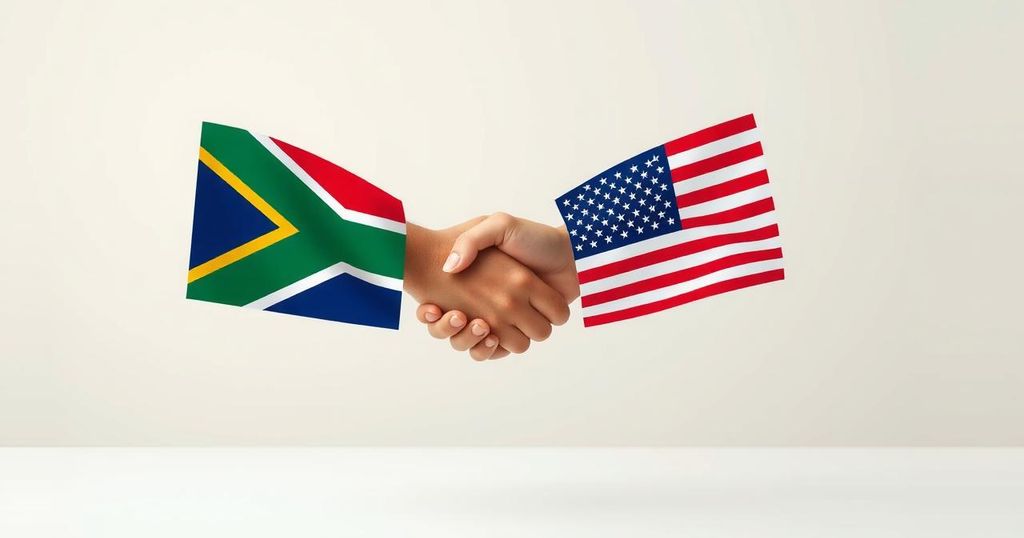High-Stakes Diplomatic Dance Between Ramaphosa and Trump: What Lies Ahead?
President Ramaphosa is to meet Trump at the White House amid rising tensions over land reforms and asylum for Afrikaners. Economic aid cuts and tariffs threaten South Africa’s stability. This meeting is pivotal for both bilateral relations and the upcoming G20 Summit in Johannesburg.
This week, South African President Cyril Ramaphosa is set to meet with U.S. President Donald Trump at the White House. The focus will be on various bilateral, regional, and global topics. This meeting is significant as it marks the first time an African leader will be welcomed by the current U.S. administration.
Tensions have heightened between the two nations since Trump’s 2025 return to the presidency, largely due to his support for questionable narratives around a so-called “white genocide” in South Africa affecting Afrikaner farmers. Trump’s claims, stated during his recent announcements, suggested that these farmers are facing dangerous persecution. This narrative has stirred considerable controversy both domestically and internationally.
Just last week, the U.S. granted asylum to over 40 South Africans, based on claims they were “living under a shadow of violence”. However, Ramaphosa and his administration contest these claims, stating that the allegations of genocide are baseless. Several Afrikaner stakeholders, including groups like AfriForum, have dismissed Trump’s asylum offer, reinforcing their intention to remain in South Africa and tackle local issues directly.
As President Ramaphosa expressed, “As South Africans, we are resilient. We do not run away from our problems. We must stay here and solve our problems. When someone runs away, that is a cowardly act.”
Adding to the complexities around this issue is Elon Musk’s chatbot, Grok. Musk’s AI has stirred up controversy on social media by repeatedly spreading misinformation regarding South Africa, further complicating the public narrative. Users have criticized Grok for its persistent promotion of the “white genocide” theory, a claim that has already been disproved by the South African courts.
This has led to a wave of reactions from both citizens and prominent figures, such as journalist Qaanitah Hunter who voiced her concerns on social media about the potential implications of Musk’s tool in spreading misinformation. Redi Tlhabi, another notable voice, argues the situation shows a coordinated disinformation campaign against South Africa.
Economic ramifications from Trump’s administration’s policies have increasingly impacted South Africa. His executive actions to cut aid, particularly funding for vital HIV and AIDS programs, are causing distress. South Africa relies heavily on U.S. support, which accounts for a significant part of its health budget. Many organizations are now grappling with funding uncertainty, which could threaten years of progress.
Moreover, a steep 30% tariff on South African goods, as well as a notable vehicle surcharge, has drawn Ramaphosa’s ire. He described these tariffs as harmful to fair trade and noted that relations are becoming strained with the upcoming decision regarding the African Growth and Opportunity Act (AGOA).
The meeting’s importance extends beyond bilateral discussions, as it will greatly influence the forthcoming G20 Summit in Johannesburg. South Africa hopes to assert itself as a leader of the Global South. However, ongoing tensions and the suggestion that Trump may boycott the summit add a layer of unease. With Trump’s history of rhetoric about land expropriation policies, questions remain about how this meeting could reshape international perceptions of the region, particularly when U.S. officials, including Secretary of State Marco Rubio, have declined to engage in preparatory events.
The challenges surrounding South Africa’s position on key global issues, including its stance on Israel and the Ukraine crisis, further complicate U.S.-South African relations. The South African government has elicited U.S. frustration recently after its claims against alleged Israeli actions and subsequent expulsion of South African ambassador Ebrahim Rasool.
President Ramaphosa’s diplomatic visit to the U.S. is framed as a step towards clarifying the relationship, but navigating the tangled web of dialogue over land reform, trade, and militarized alliances may pose a daunting task. The anticipation surrounding this summit contrasts sharply with the underlying tensions, suggesting that significant anxieties will persist as both leaders move forward.
The upcoming meeting between Presidents Ramaphosa and Trump represents a crucial moment in U.S.-South African relations, filled with potential for both conflict and resolution. Amid rising tensions linked to Trump’s rhetoric on land reform and asylum for Afrikaners, the diplomatic exchange will also influence South Africa’s role in the G20 Summit. Economic repercussions, misinformation, and the historical context of global alliances further complicate the landscape, leaving many questions about the future trajectory of these relations.
Original Source: allafrica.com




Post Comment